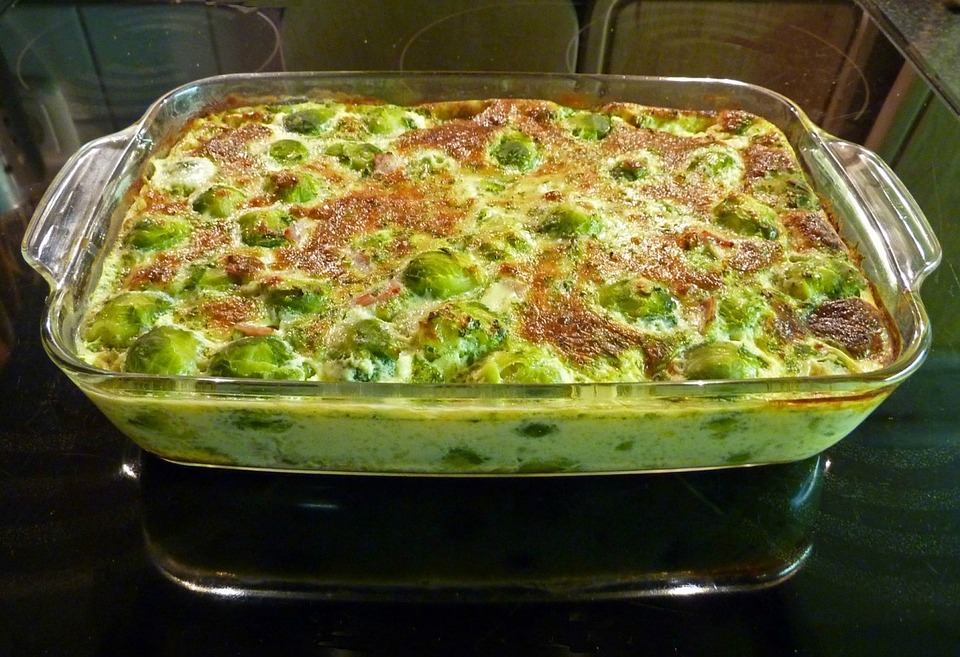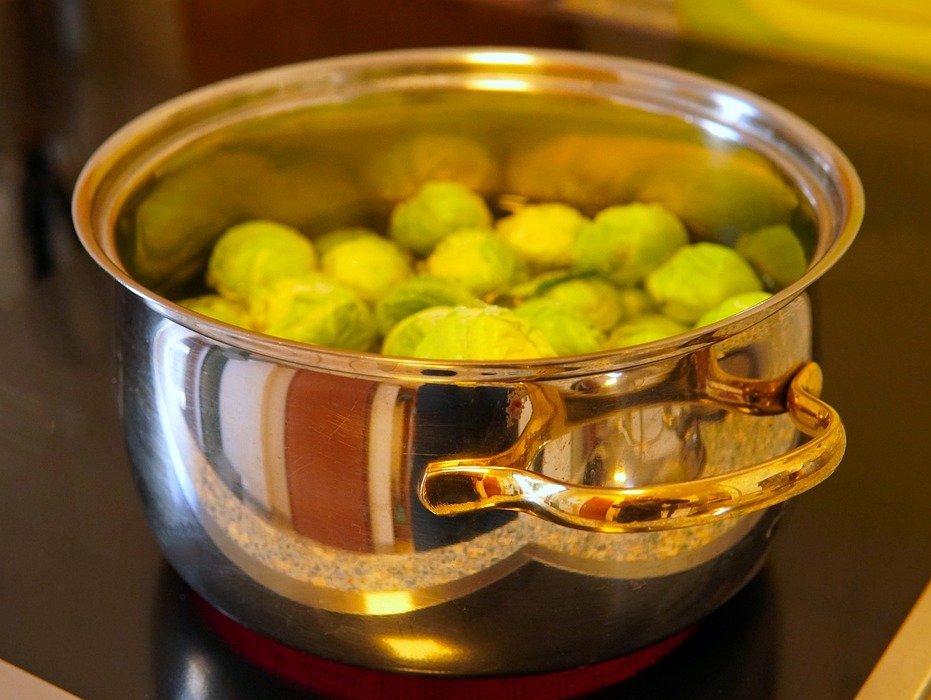This article provides a comprehensive guide to feeding Brussels sprouts to rabbits, exploring their nutritional value, potential benefits, and potential risks. We will delve into safe feeding practices, address common concerns, and offer practical advice to ensure a healthy and happy rabbit.
Part 1: Understanding Brussels Sprouts and Their Nutritional Value

1.1 The Nutritional Profile of Brussels Sprouts
Brussels sprouts are a member of the cruciferous vegetable family, known for their distinctive, small, cabbage-like heads. They are packed with essential nutrients that can benefit rabbits.
- Vitamins: They are rich in vitamins C, K, and A, which are vital for a robust immune system, blood clotting, and healthy vision respectively.
- Minerals: Brussels sprouts are also a good source of potassium, magnesium, and iron. Potassium is essential for muscle function and nerve health, magnesium aids in bone health and energy production, and iron is crucial for red blood cell production.
- Dietary Fiber: The high fiber content in Brussels sprouts supports healthy digestion, promoting a smooth passage of food through the digestive tract and contributing to a balanced gut microbiome.
- Antioxidants: Brussels sprouts are loaded with antioxidants, which help protect cells from damage caused by free radicals and may contribute to overall health and longevity.
Part 2: The Benefits of Brussels Sprouts for Rabbits

2.1 Improved Digestive Health
The high fiber content in Brussels sprouts is a boon for rabbit digestion. Fiber helps regulate bowel movements, preventing constipation and promoting the passage of waste. This is essential for maintaining a healthy digestive system, preventing intestinal blockages, and supporting a healthy gut microbiome.
2.2 Boosting the Immune System
Vitamins C and A, found in abundance in Brussels sprouts, are critical for a strong immune system. Vitamin C helps produce white blood cells, which fight infections, while Vitamin A plays a role in maintaining healthy skin and mucous membranes, providing a barrier against pathogens.
2.3 Enhanced Vision and Eye Health
Vitamin A, also known as retinol, is essential for maintaining healthy vision. It helps the eyes adapt to darkness, reduces the risk of night blindness, and supports overall eye health.
2.4 Strong Bones and Teeth
Brussels sprouts contain calcium and phosphorus, which are crucial for strong bones and teeth. Calcium is the building block of bones, while phosphorus helps with bone growth and repair.
Part 3: Safely Introducing Brussels Sprouts to Your Rabbit
3.1 Preparing Brussels Sprouts for Rabbit Consumption
- Wash Thoroughly: Always wash Brussels sprouts thoroughly under running water to remove any dirt, pesticides, or bacteria.
- Remove Outer Leaves: Remove the outer leaves, which may be wilted or damaged, as these can be harder for rabbits to digest.
- Chop into Bite-Sized Pieces: Cut Brussels sprouts into small, bite-sized pieces to prevent choking hazards. This is especially important for smaller rabbits.
- Steaming or Boiling: Lightly steaming or boiling Brussels sprouts for a few minutes softens them and makes them easier for rabbits to digest. Avoid overcooking, as this can reduce their nutritional value.
3.2 The Gradual Introduction
- Start Small: Begin by offering a small amount of cooked Brussels sprout, about a teaspoonful, to see how your rabbit reacts. Observe their behavior and look for any signs of digestive issues.
- Monitor for Digestive Upset: Watch out for any symptoms like diarrhea, gas, or bloating. If any of these occur, stop feeding Brussels sprouts and consult with your veterinarian.
- Increase Gradually: If your rabbit tolerates Brussels sprouts well, you can slowly increase the amount over several days. It's important to introduce new foods gradually to prevent digestive upset.
- Variety is Key: Ensure a varied diet for your rabbit, offering a variety of vegetables, herbs, and hay. This helps them get a diverse range of nutrients and supports healthy digestion.
Part 4: Potential Risks and Considerations
4.1 Goitrogens: A Potential Concern
Brussels sprouts, like other cruciferous vegetables, contain goitrogens, which are compounds that can interfere with thyroid hormone production. However, the goitrogen content in Brussels sprouts is relatively low and is unlikely to pose a significant risk to healthy rabbits, especially when consumed in moderation.
4.2 Digestive Issues: Possible Side Effects
- Gas and Bloating: Brussels sprouts, like other cruciferous vegetables, can cause gas and bloating in rabbits if consumed in large quantities. This is due to their high fiber content, which can be difficult for some rabbits to digest.
- Diarrhea: Some rabbits may experience diarrhea after consuming Brussels sprouts, especially if they are not used to them. If diarrhea persists, it is important to stop feeding Brussels sprouts and consult with your veterinarian.
- Individual Tolerance: Rabbits have varying tolerances to different foods. What works for one rabbit may not work for another. Observe your rabbit's reaction to Brussels sprouts and adjust accordingly.
4.3 The Importance of a Balanced Diet
- Limit Brussels Sprouts Intake: Brussels sprouts should be offered as a treat, not a staple food. They should make up a small portion of your rabbit's overall diet.
- Hay as the Foundation: Hay should constitute the majority of a rabbit's diet, providing essential fiber and nutrients for optimal health.
- Variety of Fresh Vegetables: Offer a variety of fresh vegetables in moderation, with Brussels sprouts being only one component. This ensures a diverse range of nutrients and helps prevent imbalances.
- Consult a Veterinarian: If you have any concerns about your rabbit's diet, consult with a qualified veterinarian. They can provide tailored advice based on your rabbit's individual needs.
Part 5: FAQs About Feeding Brussels Sprouts to Rabbits
5.1 Can Baby Rabbits Eat Brussels Sprouts?
It's best to avoid feeding Brussels sprouts to baby rabbits under 3 months old. Their digestive systems are still developing, and they may be more susceptible to digestive issues from cruciferous vegetables.
5.2 How Often Can I Give My Rabbit Brussels Sprouts?
It's generally safe to offer Brussels sprouts to adult rabbits 1-2 times a week in moderation. Start with a small amount and observe their reaction.
5.3 Can I Give My Rabbit Raw Brussels Sprouts?
While raw Brussels sprouts are safe for rabbits, it's best to steam or boil them lightly to soften them and make them easier to digest. This can also help reduce the risk of choking.
5.4 Can I Give My Rabbit Brussels Sprouts Every Day?
It's not recommended to give Brussels sprouts to rabbits every day. A varied diet, with a focus on hay, fresh vegetables, and occasional treats, is crucial for rabbit health.
5.5 My Rabbit Has Digestive Issues After Eating Brussels Sprouts. What Should I Do?
If your rabbit experiences digestive issues after eating Brussels sprouts, stop feeding them this vegetable and consult with your veterinarian. They can help determine the cause of the issue and recommend appropriate treatment.
5.6 Are There Other Vegetables Similar to Brussels Sprouts That I Can Offer My Rabbit?
Yes, there are several other cruciferous vegetables that rabbits can enjoy in moderation, including broccoli, kale, and cauliflower. Always introduce new foods gradually and monitor for any adverse reactions.
5.7 Is There Any Time of Year When It's Best to Avoid Brussels Sprouts for My Rabbit?
Brussels sprouts are generally safe for rabbits year-round. However, it's always a good idea to observe your rabbit's reaction to any new food, regardless of the season.
5.8 What Are Some Other Healthy Treats I Can Offer My Rabbit?
In addition to Brussels sprouts, other healthy treat options for rabbits include:
- Parsley
- Basil
- Cilantro
- Dandelion greens
- Bell peppers
- Strawberries
- Blueberries
Remember to introduce new treats gradually and observe your rabbit's reaction.
Part 6: Final Thoughts
Feeding Brussels sprouts to rabbits can be a healthy addition to their diet, providing valuable nutrients. However, it's crucial to understand the potential risks and to feed them in moderation. By following the guidelines outlined in this article, you can ensure that your rabbit enjoys the benefits of Brussels sprouts while staying healthy and happy.
Everyone is watching
-

Do Rabbits Lay Eggs? (The Surprising Truth)
OTHER TYPES OF PETSThis article will unravel the common misconception that rabbits lay eggs, exploring the fascinating world of r...
-

What's a Group of Rabbits Called? (A Comprehensive Guide)
OTHER TYPES OF PETSThis article delves into the fascinating world of rabbits, exploring the various terms used to describe a grou...
-

Can Rabbits Eat Grapes? A Guide to Safe Rabbit Treats
OTHER TYPES OF PETSThis comprehensive guide will explore the safety and suitability of grapes for rabbits, providing detailed inf...
-

Predators That Hunt Rabbits: A Guide to Natural Enemies
OTHER TYPES OF PETSI've always been fascinated by the circle of life, that delicate dance between predator and prey. Growing up ...
-

Are Rabbits Nocturnal Animals?
OTHER TYPES OF PETSThe question of whether rabbits are nocturnal animals is a fascinating one, with a surprisingly complex answer...
